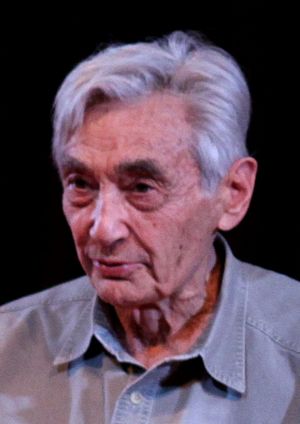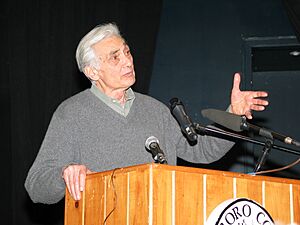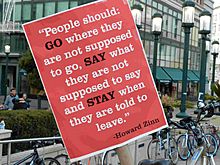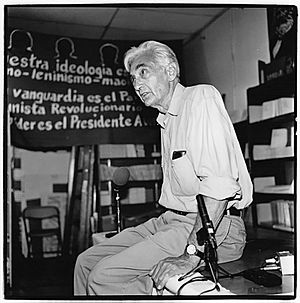Howard Zinn facts for kids
Quick facts for kids
Howard Zinn
|
|
|---|---|

Zinn in 2009
|
|
| Born | August 24, 1922 New York City, New York, US
|
| Died | January 27, 2010 (aged 87) |
| Education | New York University (BA) Columbia University (MA, PhD) |
| Occupation | Historian, educator, author, playwright |
| Spouse(s) |
Roslyn Shechter
(m. 1944; died 2008) |
| Children | 2, including Jeff |
| Scientific career | |
| Institutions | Spelman College Boston University |
| Thesis | Fiorello LaGuardia in Congress (1958) |
| Military career | |
| Allegiance | United States |
| Service/ |
U.S. Army Air Forces |
| Years of service | 1941–1945 |
| Rank | Lieutenant |
Howard Zinn (August 24, 1922 – January 27, 2010) was an American historian, playwright, and philosopher. He was also a World War II veteran. Zinn taught history at Spelman College and later political science at Boston University.
He wrote more than 20 books. His most famous book is A People's History of the United States, published in 1980. This book tells American history from the viewpoint of ordinary people. In 2007, he released a version for younger readers called A Young People's History of the United States.
Zinn described himself as a "democratic socialist." He wrote a lot about the Civil Rights Movement, the anti-war movement, and the history of workers' rights. His life and work were also featured in a 2004 documentary called Howard Zinn: You Can't Be Neutral on a Moving Train. Zinn passed away in 2010 at the age of 87.
Contents
Growing Up and Early Life
Howard Zinn was born in Brooklyn, New York City, on August 24, 1922. His parents were immigrants from Eastern Europe. His father worked hard as a ditch digger and window cleaner. For a short time, his parents ran a small candy store.
His parents had limited education and there were no books at home. Zinn discovered literature by sending coupons from The New York Post to get books by Charles Dickens. When he was young, he met some Communists in his neighborhood. They invited him to a peaceful political rally in Times Square. Police charged the marchers, and Zinn was hit and knocked out. This event deeply affected his views on society and politics.
Zinn studied writing at Thomas Jefferson High School. He initially did not want the U.S. to join World War II. However, he changed his mind after learning more about fascism in Europe. In 1940, at age 18, he started working as a shipfitter at the New York Navy Yard.
He and other apprentices formed a group to fight for better wages and safer working conditions. This experience taught him a lot about fairness and the importance of unions.
Serving in World War II
Zinn joined the U.S. Army Air Corps during World War II because he wanted to fight fascism. He became an officer and a bombardier. He dropped bombs on targets in Europe. In April 1945, he dropped napalm bombs on Royan, a town in France.
Years later, Zinn visited Royan to research what happened. He found out that the bombing had killed over a thousand French civilians. Local records called it "a tragic error." This experience, and learning that the bombing was ordered for career reasons rather than military ones, greatly shaped his later anti-war views.
He realized that military actions often hurt many innocent people. He questioned bombings in cities like Dresden, Tokyo, and Hiroshima in World War II. These experiences made him a strong voice against war and violence towards civilians.
His Education Journey
After World War II, Zinn used the GI Bill to go to college. He earned his bachelor's degree from New York University in 1951. He then went to Columbia University, where he earned his master's degree in 1952 and his PhD in history in 1958.
His PhD paper was about Fiorello La Guardia's time in Congress. Zinn showed how LaGuardia fought for public power and workers' rights. This work was even nominated for a major history award.
His Career as a Professor
Teaching History
From 1956 to 1963, Zinn was a history professor at Spelman College in Atlanta. He also taught as a visiting professor in Paris and Bologna. In 1963, he was fired from Spelman. The college president felt Zinn was making students too radical.
In 1964, Zinn started teaching at Boston University (BU). He had already written two books and was active in the Civil Rights Movement. His classes on civil liberties were very popular, with hundreds of students attending. He taught at BU for 24 years, retiring in 1988.
A colleague, Caryl Rivers, said Zinn had a strong sense of fairness and justice. She also noted he always kept his sense of humor. Zinn and Rivers were among professors who supported clerical workers' right to strike at BU.
Zinn believed that traditional history books often missed important perspectives. He wrote A People's History of the United States to share other viewpoints. This book tells the stories of Native Americans, enslaved people, workers, women, and African Americans. It became a finalist for the National Book Award in 1981.
A People's History is now used in many college history courses. It sells over 100,000 copies each year. In 2004, Zinn published Voices of a People's History of the United States. This book includes speeches, essays, poems, and songs from the people whose stories are in A People's History.
In 2008, the Zinn Education Project was created. It helps teachers use A People's History of the United States in middle and high schools. The project offers free lesson plans online.
The People Speak, a documentary released in 2010, is based on Zinn's book. It features actors and musicians reading historical speeches and writings. The film shows how ordinary people fought for change throughout U.S. history.
Fighting for Civil Rights
While at Spelman College, Zinn was very involved in the Civil Rights Movement. He advised the Student Nonviolent Coordinating Committee (SNCC). He wrote articles about their sit-ins and protests. In 1964, he published a book called SNCC: The New Abolitionists.
Zinn helped SNCC create an education program for civil rights workers. Many of these workers were college students who had left school to join the movement. Zinn wanted them to continue their education while fighting for civil rights.
He traveled to places like Hattiesburg, Mississippi, to support voter registration drives. He knew the work was dangerous. Just six months earlier, civil rights activist Medgar Evers had been murdered.
Zinn also helped plan Freedom Summer in Mississippi in 1964. This project brought 1,000 college students to Mississippi to work for civil rights. He helped develop the curriculum for "Freedom Schools." He was worried about the students' safety and asked for protection from the government, but it was not provided.
During Freedom Summer, three civil rights workers, James Chaney, Andrew Goodman, and Michael Schwerner, were murdered. Zinn attended their memorial service.
Zinn worked with other historians to mentor student activists. These students included Alice Walker, who later wrote The Color Purple, and Marian Wright Edelman, who founded the Children's Defense Fund. Edelman said Zinn was a major influence in her life.
Even though he had a permanent teaching job, Zinn was fired from Spelman in 1963. This happened because he supported students who were fighting against segregation. He wrote that his years at Spelman were the most "interesting, exciting, most educational" for him. He felt he learned more from his students than they learned from him.
Zinn wrote about many violations of basic rights in the South, like freedom of speech and equal protection. He noted that the government did little to stop segregationists from hurting civil rights workers.
In 2005, 41 years after being fired, Zinn returned to Spelman College. He received an honorary degree and gave a speech. He told the students not to give up, saying that "if you are right, and you persist, things will change."
Working for Peace
Against the Vietnam War
Howard Zinn was one of the first people to write a book calling for the U.S. to leave the war in Vietnam. His book, Vietnam: The Logic of Withdrawal, came out in 1967.
In 1968, Zinn went to Hanoi with Reverend Daniel Berrigan. They helped bring back three American airmen who were prisoners of war. This event was widely reported in the news. Zinn and the Berrigan brothers remained friends and allies.
Zinn also signed a pledge to refuse tax payments to protest the war.
In 1971, Daniel Ellsberg secretly copied the Pentagon Papers, which showed the history of U.S. involvement in Vietnam. Ellsberg gave a copy to Howard and Roslyn Zinn. Zinn helped edit and publish these papers.
Zinn testified in Ellsberg's trial. He explained the history of U.S. involvement in Vietnam to the jury. Most jurors later said they would have voted to acquit Ellsberg. The case was eventually dismissed due to government misconduct.
Zinn supported the G.I. (soldiers') anti-war movement during the Vietnam War. He provided historical context for a 1971 anti-war march by Vietnam veterans. He also took part in other major protests.
Against the Iraq War
Zinn also opposed the 2003 invasion and occupation of Iraq. He wrote several books about it. He believed that resistance from within the military would eventually help end the war, similar to what happened in Vietnam.
He compared the demands of military families to end the Iraq War to those during the Civil War. At that time, soldiers' wives protested because their husbands were dying while plantation owners profited.
A history professor at Yale University noted that Zinn's historical work is "highly influential." He added that it's common for professors like Zinn to speak out on current events, especially during times of national crisis.
His Views on Society
Zinn described himself as "something of an anarchist, something of a socialist. Maybe a democratic socialist." He believed that socialism, when viewed in its full history, was a positive idea. He felt it got a bad reputation because of its connection to Soviet Communism.
FBI Files and Surveillance
In 2010, the Federal Bureau of Investigation (FBI) released over 400 pages of files about Howard Zinn. The FBI started investigating Zinn in 1949 during the time of McCarthyism. They were concerned about his activities in groups they thought were linked to communism.
Zinn always denied being a member of the Communist Party. He said he participated in various organizations because he believed people had the right to think and act freely. A journalist, Chris Hedges, noted that Zinn "steadfastly refused to cooperate in the anti-communist witchhunts."
Later, in the 1960s, because of his work against the Vietnam War and his communication with Martin Luther King Jr., the FBI labeled him a high security risk. They put him on a list of citizens who could be arrested if a state of emergency was declared. The FBI was also concerned about Zinn's criticism of them for not protecting Black people from white mob violence. Zinn's daughter said she wasn't surprised by the files, as her father "always knew they had a file on him."
Personal Life and Passing
Howard Zinn married Roslyn Shechter in 1944. They were married until her death in 2008. They had two children, Myla and Jeff.
Howard Zinn passed away on January 27, 2010, in Santa Monica, California. He was 87 years old and died of a heart attack while swimming. He had been scheduled to speak at an event called "A Collection of Ideas... the People Speak."
He once said he wanted to be remembered as "somebody who gave people a feeling of hope and power that they didn't have before."
Awards and Recognition
- In 1991, Zinn received the Thomas Merton Award for his work on peace and social justice.
- In 1996, he was given the Peace Abbey Courage of Conscience Award for his leadership in the Peace Movement.
- In 1998, he received the Eugene V. Debs Award and the Lannan Literary Award for nonfiction.
- In 1999, he won the Upton Sinclair Award, which honors those who work for social justice.
- In 2003, he won the Prix des Amis du Monde diplomatique for the French version of A People's History of the United States.
- In 2006, he received the Haven's Center Award for his important contributions to scholarship.
- In 2008, Howard Zinn was chosen as a special senior advisor to the president of the United Nations General Assembly.
- The Zinn Education Project, started by a former student and two non-profit groups, continues his legacy. It provides free lessons for middle and high school teachers based on A People's History of the United States.
See also
 In Spanish: Howard Zinn para niños
In Spanish: Howard Zinn para niños
- List of peace activists
 | Stephanie Wilson |
 | Charles Bolden |
 | Ronald McNair |
 | Frederick D. Gregory |




